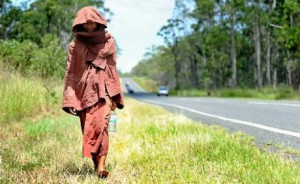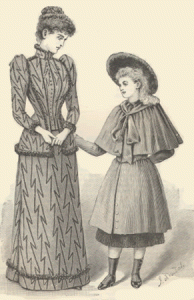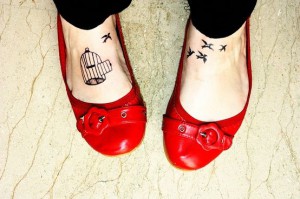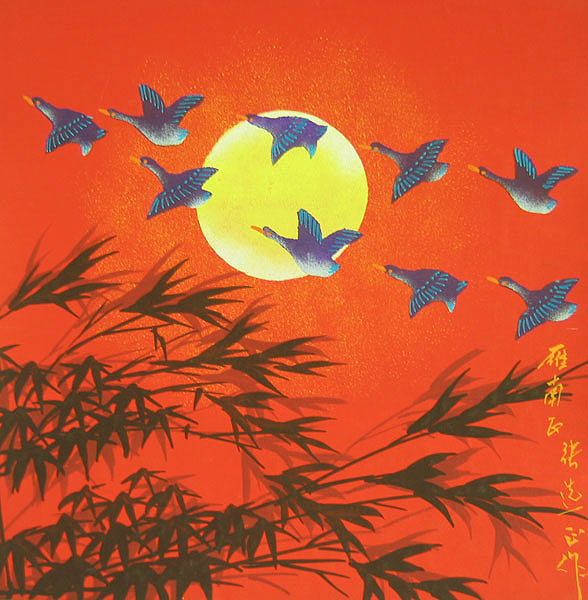< How should I live? >
I consider myself a modern day, itinerant Buddhist monk. Given my line of work, this might seem ironic. But I’m a Shaolin 少林 kungfu practicioner, and I ground my Buddhist practice – my meditative practice, mental clarity, and fighting spirit – in the practice of martial arts. Though I began practicing out of a sense of anger, after a violent assault, as a way to defend myself in the future and deal with all my chaotic post-traumatic emotions, I have discovered that the Shaolin style of wushu 武術 is actually not very effective for self-defense. It is dance-like and repetitive. It can be extremely frustrating to practice the same moves over and over again, knowing that none of these moves would never serve in a real fight. However, kung fu (功夫 – “hard work”) is very good for cultivating inner strength, patience, focus, and discipline. It is also a way for me to connect with my ancestry. I appreciate being able to trace my life to a lineage of ascetic devotion by training myself to be a 35th Generation Shaolin Monk.
Ch’an Buddhism 禪那 developed in the 6th Century, coming out of the Mahayana Buddhist practice in India, and from China, it was passed forward from China to Vietnam, Korea, and finally Japan in the 13th Century, where it became Zen Buddhism, the form of Buddhism that is most familiar to the Western world due to popular Beatnik adaptations in the 1960’s. As a young person born in the East but educated in the West, I first encountered Buddhism through a Western book: Siddharta by Herman Hesse, a German author. I can not claim that my partial understanding of Chinese language and culture privileges my access to some more “authentic” Buddhism, as much has been compromised in the East over centuries of socioeconomic pragmatism – I search for the essence of Buddhist teachings, and endeavor to practice that essence in modern life. While I have mixed feelings about the role of women in Buddhism, especially in Japan, I also have a certain geeky fascination with Samurai culture during the Edo Period, and the Bushido warrior code – 武士道 (hiragana ぶしどう).
I think I was definitely born into the wrong decade because I have such a flower child attraction to the kind of thinking that dominated in 1968: an appreciation for French existentialist philosophy, a revolutionary attitude towards free sexuality and gender equality, a rebellious instinct, and a deep sense of sympathy towards social outcasts.
I read and reflect a lot on moral philosophy and the “good life,” partially perhaps because it takes up a lot of mental energy to rationalize being an American in the belly of the beast, living comfortably off the labor and oppression of others. Rather than going abroad to try to build wells in other countries and engage in NGO-imperialism, I would rather focus on changing my country’s laws to reduce the harmful effects on others, and leveraging my American citizenship towards these ends.
I also want to be as good a person as I can be, and make people in my life, and in my communities, just a little bit happier and healthier, with my presence in their lives. I try to be warm, caring, gentle, understanding, and nurturing towards the people around me. With all the pain and trauma that we all carry in our lives, it is important to maintain a space of healing and love for one another.
Though my ethics might often deviate from mainstream norms, and seem radical for a lot of people – I try my best to stick by my principles, and endeavor to be thoughtful, fair-minded, and clear about what I believe in. I don’t think there is anything inherently wrong with being a sexual minority. I am an anti-violence activist focused more on state violence, mass incarceration, and corruption than on individual acts of violence commited by people who are already marginalized by society.
I believe whole-heartedly in transformative justice.
I celebrate marginality because it is always both a site of struggle and one of great creativity.
Freedom and Service
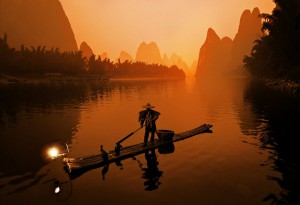 Like a Taoist fisherman who sits peacefully with cormorants in a wooden boat, I idealize the humble and simple life. I want no power, no prestige, no wealth, no fame, no legacy under my name. Action through non-action: 為無為 (wei wu wei). I want no ambition, no achievement, no ego, and I seek happiness by disappearing.
Like a Taoist fisherman who sits peacefully with cormorants in a wooden boat, I idealize the humble and simple life. I want no power, no prestige, no wealth, no fame, no legacy under my name. Action through non-action: 為無為 (wei wu wei). I want no ambition, no achievement, no ego, and I seek happiness by disappearing.
No matter what I do, I need to have the freedom to disappear and start again. I struggle with how selfish this need is, and how it sometimes brings pain to people I love. I try my best to create relationships with conscious care and openness.
Ascetism and Self-Discipline
In order to create greater freedom, I need to achieve greater discipline. I also have to abstain from things that entrap people in a more restrained way of life. Here are the three crucial things I choose to sacrifice, and abstain from:
- Getting rid of my material possessions and material needs. Living light, out of a backpack, with my stripper heels. Travelling the world. Realizing that I’ll never be rich, and I’ll probably never focus enough to achieve world-class success in any particular field. Accepting my limitations, and enjoying my time in the world.
- Refusing to get married to a man in my 20s and (early?) 30s, in spite of all my parents’ nagging, pleading, and threatening. I question the mandate of marriage and babies in a time of overpopulation. I have siblings, so the genes will pass on just fine without me. I think I would make a great aunt, or an adoptive second mother to a single mom. I really love children and animals, but I have no desire to possess any – but my home will always be a place where I can care for strays. I’ve always imagined I would end up living in a queer communal house in the countryside, off the grid, full of babies in some kind of shared polyamorous parenthood. I don’t know. I’m just not in a hurry to marry or reproduce, and this buys me an extra decade or two of freedom to travel without some imaginary biological clock ticking away at my feminine jail cell. I am queer and poly, and love multiple men and women, and I believe in expanding the definition of marriage/partnership to include more than two members in a family – this might seem revolutionary, but to me it is only logical. The two-person home puts unfair amounts of stress on mothers to be “superwomen” while juggling a career and child-rearing; I’d rather be the breadwinner for a stay-at-home dad or mom, rather than denigrate the most important work of childcare to an underpaid job for migrants. I do want to build my family one day, but I want my children to be raised in a happy village, a home full of artistic and intellectual sharing, with passionate and happy adults who are good friends to one another.
- Letting go of the need for prestige or status or social recognition. “Ambition is a lonely race, and we always end in second place.” I used to want to be an academic or a lawyer or a famous writer or artist. Now I just wanna be like a simple Taoist fisherman. Except instead of a fishing rod, I have a leather whip. Small difference.
Self-mastery is freedom. I also work on practicing greater emotional control; I am too passionate a person, and too easily moved to act out of impulsive whim. I make foolish mistakes. Sometimes, I lack focus, and neglect responsibilities. I want to be a more consistent friend, and more accountable community member. I am aware that there are certain emotional and behavioral patterns that I have to work to change, and I am systematically driven to document and modify these behaviors.
I do have a thing for Victorian discipline. 😉
Lists
I like them! Here is a list of things that have inherent value, which can not be translated into monetary value. These are the only things I want in life:
- friendship
- knowledge
- creative projects
- adventure
- community-building, culture-making
- self-mastery
- craftsmanship / expertise
- freedom – spiritual transcendence
- joy
- good work every day
- truthfulness
- accountability, respect & responsibility, honor
- nurturing others
Here are the moral qualities I aspire to, which I’ve divided into the 5 H’s for being a good friend, and the 5 F’s for being a good craftsman/worker:
- Honesty
- Humility
- Hard work
- Honor / promise-keeping
- Humor
and
- Focus
- Fortitude
- Fighting spirit
- Fair-mindeness / even temper
- Follow-through
The enso 円相 circle in Zen calligraphy 筆禅道 (“way of the brush” – the hitsuzendo practice of Buddhism) symbolizes a moment when the mind is free to let the body create. I live for that rare moment of “flow” when I feel a kind of deep concentration and a natural alignment with an authentic voice within me, which moves me to express myself in new ways, pushing boundaries without striving to rebel. For me, calligraphy and brush painting is another form of more quiet and contemplative Buddhist practice, which complements my physically rigorous martial arts practice.
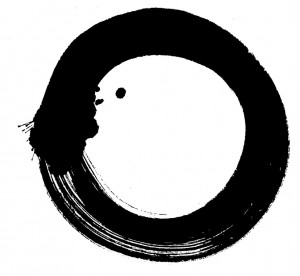 The enso circle also looks a lot like the ouroboros, the Greek image of a snake eating its own tail, symbolizing eternal return, or some primordial unity between life and death, creation and destruction. However, I also think of the circle as a symbol for the mundane and repetitive practice of mastery, and I am reminded of the story of Da Vinci’s first drawings in the master Verrocchio’s workshop – it is a story with a very Chinese kungfu spirit, and perhaps that is why it is often told and retold in China to young art students. Da Vinci was asked to draw an egg over and over again, and he realized in this process that an egg is not at all a simple object, that there is much to be learned when one looks beyond “common knowledge” and accepts the painful and irreplaceable practice towards the mastery of any craft.
The enso circle also looks a lot like the ouroboros, the Greek image of a snake eating its own tail, symbolizing eternal return, or some primordial unity between life and death, creation and destruction. However, I also think of the circle as a symbol for the mundane and repetitive practice of mastery, and I am reminded of the story of Da Vinci’s first drawings in the master Verrocchio’s workshop – it is a story with a very Chinese kungfu spirit, and perhaps that is why it is often told and retold in China to young art students. Da Vinci was asked to draw an egg over and over again, and he realized in this process that an egg is not at all a simple object, that there is much to be learned when one looks beyond “common knowledge” and accepts the painful and irreplaceable practice towards the mastery of any craft.
Mastery and practice are important words for me. Here are the things I want to master in my lifetime:
- MIND – computer science, cryptography, IT, cybersecurity, hacktivism, investigative journalism, data mining and analysis, information visualization/graphics, a lifelong pursuit of science and math, especially ecology, molecular biology, astronomy, geometry, graph theory, and the music of the spheres.
- BODY – circus, aerial dance and street performance (lyra, corde lisse, hammock, competitive pole dancing, also: handstands, flexibility, hoop, staff, and maybe poi) to be combined somehow with my cabaret singing and slam poetry, my love of all 4 elementz of hip hop: bgirling, emceeing, djing, and graff art.
- SPIRIT – shaolin kungfu, Chinese calligraphy and brush painting国画, tattooing people while teaching a historical understanding of Chinese characters and their evolution. The art of community organizing. The art of wilderness survival, and the appreciation of nature, animals, and holy music. Lifelong appreciation of history, literature, philosophy, and film.
- SEXUALITY – I think this needs to be included in the mind/body/spirit equation – its exclusion causes many troubles of repression and unhappiness for people. As a queer photographer and video artist, I must admit I enjoy erotic photography, and creating feminist pornography that challenges the abusive and sexist mainstream norms. I am shy about writing about this under my name, but I defend the freedom of expression from internet censorship, while also fighting whole-heartedly against sexual violence and inequality.
- FAMILY – friendship as a skill and vital artform. I am dedicated to serving the people I love, and fostering growth. However, for me, my home is the library, the bookstore, tiptoeing on the edges of great universities, in New York City and all the Chinatowns in the global diaspora of my people.
Lists are kind of silly though. These lists make me feel so American.
In the good old American tradition, from Benjamin Franklin and Ralph Waldo Emerson, to Stephen Covey and Daniel Goleman, I pitch self-improvement to myself like a salesman.
The Trap of Ideology and Identity:
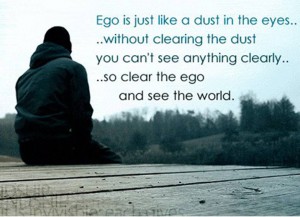 Identity is a very weird thing. Arbitrary, illusory, yet psychologically necessary. A tool for liberation that can easily turn into autocratic purism and oppression. In social justice movements, it is a strategic essentialism (Gyatri Spivak), which holds many paradoxes (Wendy Brown, Janet Halley). My identity is as a code-switcher between many different cultures, and I am privileged and disadvantaged in too many ways for any kind of superficial mapping.
Identity is a very weird thing. Arbitrary, illusory, yet psychologically necessary. A tool for liberation that can easily turn into autocratic purism and oppression. In social justice movements, it is a strategic essentialism (Gyatri Spivak), which holds many paradoxes (Wendy Brown, Janet Halley). My identity is as a code-switcher between many different cultures, and I am privileged and disadvantaged in too many ways for any kind of superficial mapping.
There is political economy and data, and as much as I love feminist standpoint theory for qualitative research, I believe that our locally-based policy advocacy must be equipped with quantitative tools and analysis of the highest level.
THE MAP IS NOT THE TERRITORY.
On a day to day basis, I just want to meet challenges as they come. I just want to make things. When things get broken, I just want to fix them. That’s all.
So no more guilt-mongering, peaceful comrade. Here is a poem that reminds us how all the things, good and bad, selfish and kind, beautiful and ugly, all fit into a family of things. You don’t have to be good. Tell me about despair, yours, and I will tell you mine. Meanwhile the world goes on.
https://soundcloud.com/brainpicker/mary-oliver-reads-wild-geese
—————————
by Mary Oliver:
WILD GEESE
You do not have to be good.
You do not have to walk on your knees
For a hundred miles through the desert, repenting.
You only have to let the soft animal of your body
love what it loves.
Tell me about despair, yours, and I will tell you mine.
Meanwhile the world goes on.
Meanwhile the sun and the clear pebbles of the rain
are moving across the landscapes,
over the prairies and the deep trees,
the mountains and the rivers.
Meanwhile the wild geese, high in the clean blue air,
are heading home again.
Whoever you are, no matter how lonely,
the world offers itself to your imagination,
calls to you like the wild geese, harsh and exciting —
over and over announcing your place
in the family of things.
